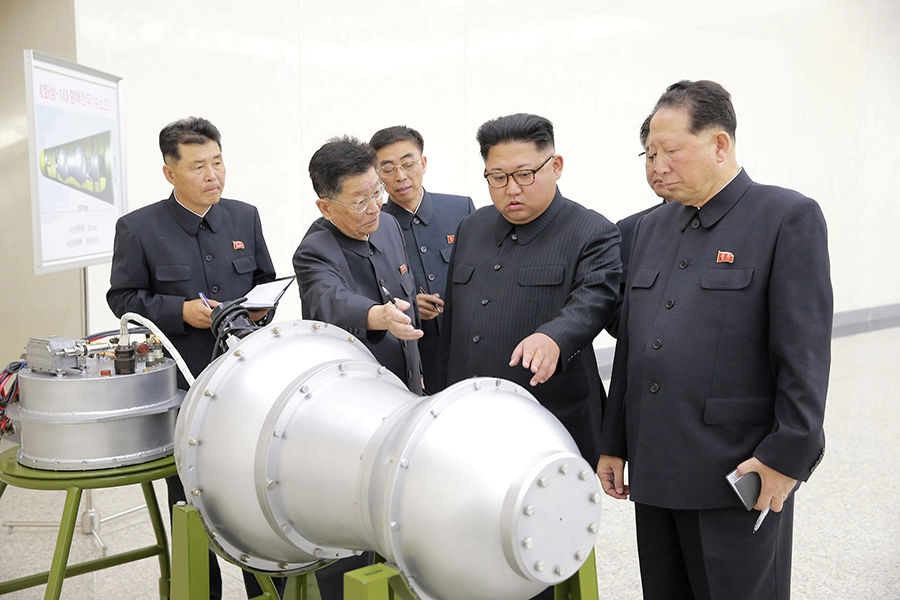It is one of the great ironies of this fraught moment in our history that while our president is making threats of total war against North Korea, whose leader is making threats of total war against us, Ken Burns’ masterful documentary “The Vietnam War” is being aired.
It is unfortunate that we are no longer in the simple media market of decades past, when one outstanding television experience could be shared and discussed by all at the water cooler or the coffee shop. For this series is a grand memento mori for all those who threaten to unleash the hounds of war. As we saw then in Vietnam and are seeing now throughout the Middle East, once these dark beasts are loosed, they are leashed again only at unimaginable cost in blood and treasure.
The Vietnam War and all that it provoked has shaped our country profoundly for more than half a century. Our distrust of government and of our own leaders, a distrust that strangely unites both the left and the right in this country, took root during that war. The casual assumptions that all our leaders are liars, that politics is dishonest and that the citizenry is left to fend for itself in uncovering the truth, are some of the poisonous fruits of that conflict. And the ideological, cultural and ethnic divisions that burst into flame on American streets during that war have never been resolved and continue to plague us today.
Vietnam was also when we as a nation entered into wars without taking responsibility for them. In Lyndon Johnson’s time, the talk was of “guns and butter” — having our cake and eating it, too. We no longer raised taxes to pay for the costs of war because that played poorly in the polls. Today we don’t even talk about it. We simply push the debt of war onto future generations and talk about tax cuts instead.
Because Americans find history boring we tend as a nation not to study it. This means that we are far less likely to understand our past mistakes and learn from them. We are cynical, but without the self-knowledge and tempered judgment that comes with truly understanding the experiences that make us so cynical. We distrust those who preach caution until it is too late, and then we blame others for what inevitably goes wrong.
Vietnam is past now, but the lessons still live. This remarkable documentary, weaving the stories of both Americans and Vietnamese — North and South — into a somber, tragic retrospective, illustrates one of Ken Burns’ central themes. While history may never neatly repeat itself, human behavior and human nature never change.
This is a truth the Church knows in its bones. Despite the constant allure of brave new worlds, the Church understands in its hard-won wisdom that our temptations, our weaknesses, our vanities, our pride and presumptions, our sins do not change. Asian or Anglo, Hispanic or Black, Northern Hemisphere or Southern, we routinely forget what our fathers and mothers learned. We succumb to the same follies — and then in amazement wonder why.
In a remarkable speech Sept. 25 at the United Nations, lost amid the casual talk of mutual annihilation by the United States and North Korea, Archbishop Paul Gallagher, the Vatican’s foreign minister, pleaded for peace.
“An environment of trust is urgently needed,” the archbishop said. “All countries should take a decisive and urgent step back from the present escalation of military preparations. The largest countries and those who have a stronger tradition of respecting human rights should be the first to perform generous actions of pacification. All the diplomatic and political means of mediation should be engaged to avoid the unspeakable,” Archbishop Gallagher pleaded.
The archbishop specifically addressed nuclear terror, warning those countries that are now nuclear powers that they must strive for disarmament and arms control, and asked those who grow rich selling arms to others to restrict the movement of these weapons.
Having been fighting not just a shadowy war on terrorism, but also boots-on-the-ground wars in Iraq and in Afghanistan for nearly a generation, Americans are becoming accustomed to endless war running in the background like a television no one has bothered to turn off. But the nuclear standoff that increasingly dominates the Korean peninsula should cause us to revisit what our Church teaches.
Fewer and fewer people remember the last time nuclear weapons were used. The indiscriminate slaughter of civilians inherent in a nuclear conflict clearly violates the Church’s teaching on the just use of force. Every effort must be made to prevent such a war, because any use of nuclear weapons is, as one expert put it, “morally problematic due to their disproportionate and indiscriminate destructive power.”
The script is not yet written for the story of this moment in our history. Let us pray some future documentarian does not once again conclude that we were warned but did not listen.

